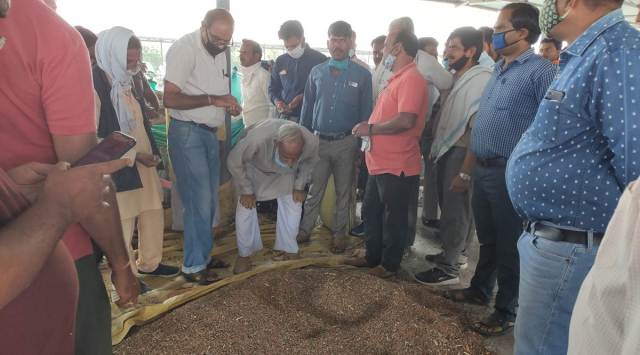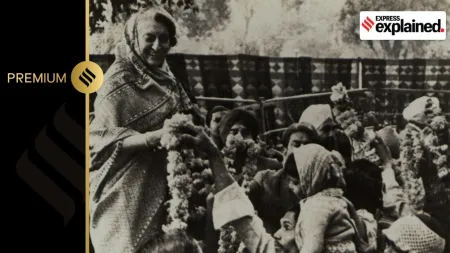- India
- International
‘There is trust… we know what our produce is worth after coming to mandi’: MP mandis resume trade after cess relief
Traders registered under the APMC Act had gone on strike against the mandi tax after the passing of farm bills, which allowed private mandis to operate without taxes and licenses while those dealing inside regulated mandis ended up paying nearly 1.7 per cent cess.
 At the Karond mandi on the outskirts of Bhopal. (Express)
At the Karond mandi on the outskirts of Bhopal. (Express)“Full daagi (fully discolored)…bolo…2,500…2,510..2,550…” shouts Suresh Kumar, gradually increasing the bids for soybean as 30 traders gather under a shed to bid for the pods brought in by Bhavani Singh, among the many farmers who have arrived at the Karond mandi on the outskirts of Bhopal to sell their produce.
The Pandit Laxminarayan Sharma Krushi Upaj Mandi Samiti in Karode, with 500 registered traders, is among 259 state-government regulated mandis in Madhya Pradesh which resumed operations last week after remaining shut for nearly two weeks since September 24. Traders registered under the APMC Act had gone on strike against the mandi tax after the passing of farm bills, which allowed private mandis to operate without taxes and licenses while those dealing inside regulated mandis ended up paying nearly 1.7 per cent cess. The strike was called off after CM Shivraj Singh Chouhan announced to reduce the tax to 0.5 percent.
With the sale of nearly 2,000 quintals of grains, the mandi still lacks its usual crowd, but Bhavani, standing next to his 40 quintals of soya bean — Madhya Pradesh’s farmers cultivate nearly half of the country’s total crop — is hopeful of a good price. The price is settled at Rs 2,605, much lower than the stipulated Rs 3,880 per quintal under the MSP, but Bhavani gives a nod for preparation of receipts.
“There is trust in the mandi. Prices can be gauged after 10 traders place their bids. And very few farmers are educated enough to estimate the price of their produce at home,” says Bhawani, when asked if he is willing to sell his produce outside the mandi, adding that immediate cash payment in a monitored environment is another major reason. However, he says his produce would not have been sold under the Minimum Support Price programme owing to its substandard quality.
Atiqur Rahman, the next soybean farmer in the row, receives the highest bid of Rs 3,700 per quintal. “Just before the auction, a trader offered Rs 3,000 per quintal… We know what our produce is worth after coming to the mandis,” he says.

According to Gopaldas Agarwal, president of Safal Anaj Dalhan Tilkhan Vyapari Mahasangh Samiti, there are about 1 lakh license-holders in MP and nearly 50,000 among them have their processing plants or warehouses inside the mandi. “When he (trader) gets the purchased produce to his plant or godown inside the mandi, apart from the transportation cost, he will be imposed with mandi tax… increasing the prices for further sale, making it too high to be competitive… trading outside the mandi is a loss-making deal,” he claims.
A licensed trader is only allowed to sell his produce to another licensed trader based on which a gate pass is issued, while no such restrictions exist for those who have their processing plants or godowns outside the mandis.
For Neeraj Maheswari, another trader at the mandi, the delimitation of powers of the mandis will end corruption across various ranks. “Ending of the need for a license will work well for traders who will give a higher margin to farmer as well,” he says.
However, Harish Gyanchandani, president of the traders’ association at Bhopal Mandi, says farmers will continue to approach regulated mandis as “there is trust here”. “The reduction in mandi taxes in MP has been some saving grace. But corporates work with a long-term margin and look at profits only at the turn of the fifth year or so. So they’ll initially give high rates. Even though sustaining losses for the first five years, it will help them destroy the ecosystem of small traders who cannot bear losses for more than a year… it will turn into a monopoly or four to five big players at best.”
Buzzing Now
May 10: Latest News
- 01
- 02
- 03
- 04
- 05






































